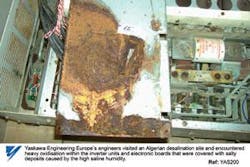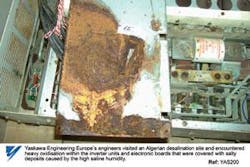Desalination: Maintenance of electronics prevents plant shutdown
Olaf Leijdekker
Yaskawa Engineering Europe repaired faulty electronic and mechanical equipment, and carried out preventive maintenance to avoid costly down-time at a desalination plant on the Algerian Mediterranean coast.
Algeria’s shortage of water resources affects its ability to meet increasing demands for drinking water, irrigation, and industry. Several factors are worsening the situation including imbalanced, spatial distribution of water, seasonal irregularities of rainfall, and vast losses of water due to aging, underfunded municipal distribution networks and insufficient infrastructure.
Algeria started investing in desalination plants during the sixties to alleviate water shortages, and to support the development of the oil and steel industry. Many plants built then lacked regular maintenance - a problem that remains.
The German company Yaskawa Engineering Europe GmbH of Schwalbach provides preventative maintenance contracts to avoid unplanned plant breakdowns. The company was called in to test and repair electronic and mechanical equipment at an Algerian desalination plant following a drive malfunction.
The conversion of seawater to drinking water is not the most arduous environment that AC drives could encounter, but the Yaskawa engineers found a motor speed control installation in the desalination plant on the Mediterranean coast that would be hard to envisage anywhere.
The plant forces seawater through a reverse osmosis membrane at between 50- and 70-bar pressures to force out the salt content by osmosis. The drinkable water is directed to tanks while the highly concentrated seawater is discharged. Yaskawa AC inverters power the pump motors that generate the pressure for the osmosis process.
Photo by Yaskawa Engineering Europe
The enclosures housing the drives are located adjacent to the membrane and to the outlet - which has very highly concentrated seawater - in each production line. With the ambient temperature inside the plant being typically 25°C to 30°C, it was little wonder that there was high humidity with a concentrated saline content present. Protection against humidity was insufficient and the location of the enclosures meant a high salty humidity inside each cabinet.
Yaskawa Engineering Europe’s engineers visited the site and encountered heavy oxidisation within the inverter units and electronic boards that were covered with salty deposits caused by the high saline humidity. They determined that these factors caused the drives to malfunction. The condensation inside the cabinet caused other damage, including oxidisation of metal parts such as screws, bars and housings. In addition, the poor condition of the insulation compromised the inverters' short circuit protection.
Variable speed drives, as standard, are resilient to most ambient conditions normally encountered in rigorous industrial environments. However, like any electrical and particularly electronic equipment, the drives are affected by contaminants carried in air, with the moist, salty air managing to permeate the inside of any cabinets with less than perfectly sealed enclosures. The cabinets in the pump drives at the desalination plant allowed ingress of the salty atmosphere, which is one of the most damagingly corrosive conditions they could encounter.
Yaskawa’s engineers tested and repaired all the faulty equipment where necessary and carried out preventative maintenance. They also advised the customer to make necessary cabinet modifications to avoid future breakdowns. In order to protect the inverters, Yaskawa offered a total closed electrical cabinet - matching IP55 classification to avoid the problem of salt deposits building up on the electronic boards. A heat exchange system was also installed and the control panel was mounted separately, as this facilitates remote access and streamlines operations. The two visiting site engineers completely remedied the problems on all 30 F7-series 37kW and 132kW inverters and the plant was once again in full production within one week.
Plant and building operators almost always have maintenance regimes to check mechanical components; bearings are checked and lubricated, gearboxes greased, and transmission components and conveyors inspected for wear or damage. Yet, rarely is the same care applied to electrical and electronic equipment. The reason such an offhand approach is taken towards electrical equipment is in part through its own inherent reliability. Mechanical components only occasionally fail completely. Bearings tend to slowly wear out and gearboxes become noisy long before they grind to a halt; however, when an electrical or electronic component fails, the result is usually a complete standstill!
Author’s Note
Olaf Leijdekker is the chief operating officer of Yaskawa Engineering Europe GmbH, located in Schwalbach, Germany. Yaskawa offers preventative maintenance contracts that are geared to ensure maximum lifetimes for all types of equipment and minimum unplanned stoppages for the plant. Yaskawa Engineering Europe undertakes repairs and refurbishment of any Yaskawa equipment to fully tested to factory quality standards and “as new” condition that is then underwritten by the company. Visit http://www.yaskawa-eng.eu.com.

